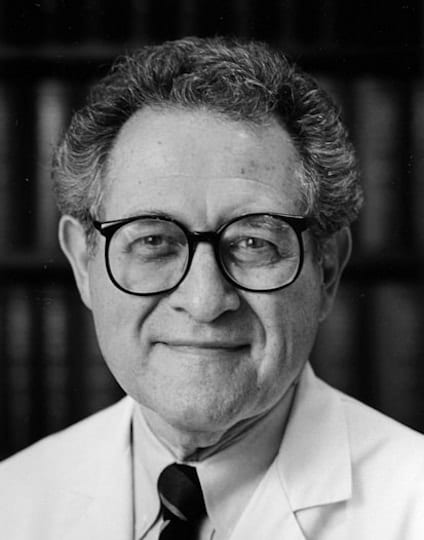
Distinguished University Professor of Medicine and Professor of Molecular Biology and Pharmacology, Dr. Kipnis developed an international reputation as a pioneer in diabetes research.
Born and raised in Baltimore, Maryland, David M. Kipnis received his MD degree from the University of Maryland and house-staff training in medicine at Johns Hopkins, Duke, and the University of Maryland, where he served as Chief Resident. He came to Washington University in 1955 as a research fellow with Nobel laureates Carl and Gerty Cori and joined the faculty upon completing the fellowship. Succeeding Carl Moore, he was appointed in 1973 as the Busch Professor and Chairman of the Department of Medicine of Washington University and served in that capacity for nearly 20 years until 1992.
His research focused on the mechanisms of insulin action, the fundamental pathogenic mechanisms responsible for the various forms of diabetes mellitus, the regulation of carbohydrate and protein metabolism in isolated cellular systems and in the intact organism, and the signal transduction pathways involved in hormone action.
His pioneering work has been recognized by many awards. In 1974 Kipnis was elected to both the Institute of Medicine and the American Academy of Arts and Sciences, and in 1981 he was elected to the National Academy of Sciences. In 1996 he was elected to a three-year term on the Council of the National Academy of Sciences. His many other honors also include the Ernest Oppenheimer Award (1967) from the Endocrine Society, the Lilly Award (1967) and Banting Medal (1977) from the American Diabetes Association, and the George M. Kober Medal (1994) from the Association of American Physicians.
His editorships include the journals Diabetes, Endocrinology, and the American Journal of Medical Sciences. Routinely sought for his scientific expertise and acumen, he has served on numerous scientific advisory and corporate boards for both companies and non-profit organizations.
He has received honorary doctorates from Washington University and his alma mater, the University of Maryland School of Medicine. Washington University honored him in 1996 with the Second Century Award and an endowed lectureship in his name in 1998.
Perhaps Dr. Kipnis’ greatest legacy, though, was his ability to recognize talented and promising young people, to create environments that nurtured the full expression of their innovative ideas, and to provide the provocative leadership that encouraged them to achieve their full potential. It was he who was instrumental in bringing to Washington University the talents and subsequent synergistic contributions of Bill Daughaday, Irene Karl, Alan Permutt, Gus Schonfeld, Lou Avioli, and Phil Cryer.